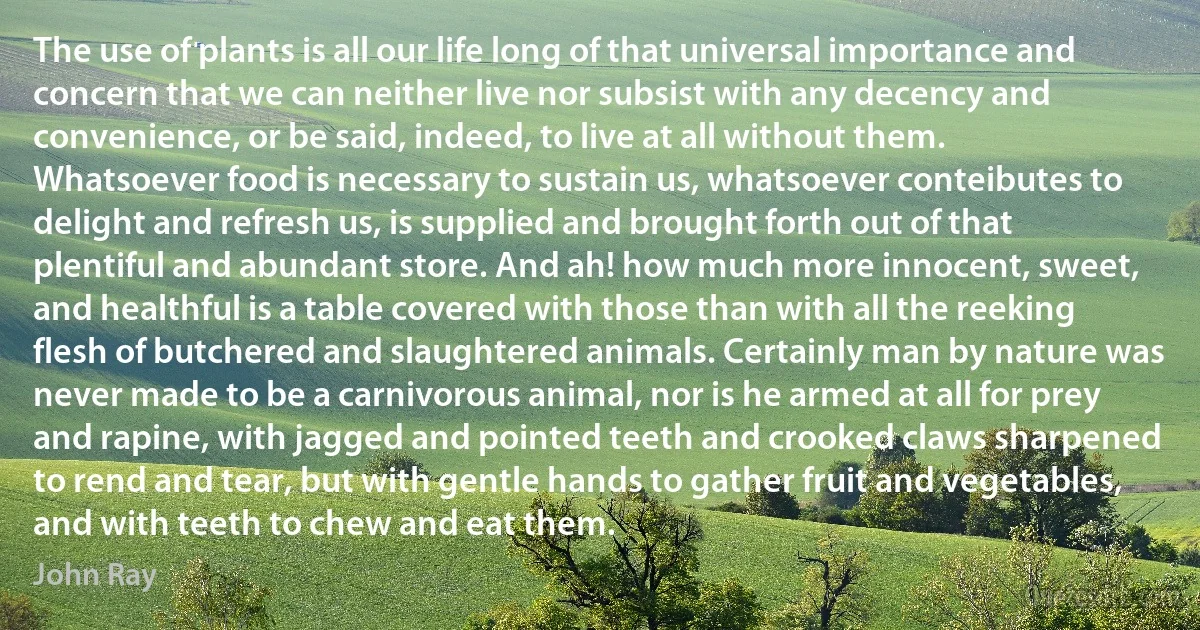
The use of plants is all our life long of that universal importance and concern that we can neither live nor subsist with any decency and convenience, or be said, indeed, to live at all without them. Whatsoever food is necessary to sustain us, whatsoever conteibutes to delight and refresh us, is supplied and brought forth out of that plentiful and abundant store. And ah! how much more innocent, sweet, and healthful is a table covered with those than with all the reeking flesh of butchered and slaughtered animals. Certainly man by nature was never made to be a carnivorous animal, nor is he armed at all for prey and rapine, with jagged and pointed teeth and crooked claws sharpened to rend and tear, but with gentle hands to gather fruit and vegetables, and with teeth to chew and eat them.
John RayRelated topics
animal chew delight eat flesh food forth fruit gather gentle innocent jag life live man nature necessary nor prey rapine say store sweet table tear teeth universal use handsRelated quotes
Man's carnivorous nature is not taken for granted, or praised in the fundamental teachings of Judaism. The rabbis of the 111:32). The implication is clear, that Judaism was engaged in weaning men from such practices. Judaism as a religion offers the option of eating animal flesh, and most Jews do, but in our own country there has been a movement towards vegetarianism among very pious Jews. A whole galaxy of central rabbinic and spiritual teachers including several past and present Chief Rabbis of the Holy Land, have been affirming vegetarianism as the ultimate meaning of Jewish moral teaching. They have been proclaiming the autonomy of all living creatures as the value which our religious tradition must now teach to all of its believers.

Arthur Hertzberg
It is often said, as an excuse for the slaughter of animals, that it is better for them to live and to be butchered than not to live at all. ... In fact, if we once admit that it is an advantage to an animal to be brought into the world, there is hardly any treatment that cannot be justified by the supposed terms of such a contract. Also, the argument must apply to mankind. It has, in fact, been the plea of the slave-breeder; and it is logically just as good an excuse for slave-holding as for flesh-eating. It would justify parents in almost any treatment of their children, who owe them, for the great boon of life, a debt of gratitude which no subsequent services can repay. We could hardly deny the same merit to cannibals, if they were to breed their human victims for the table, as the early Peruvians are said to have done.

Henry Stephens Salt
Here was the worldly environment with which Fauchery is so often reproached. But the books and papers that littered the table bore witness that the present occupant of this charming retreat remained a substantial man of letters. His habit of constant work was still further attested by his face, which I admit, gave me all at once a feeling of remorse for the trick I was about to play him. If I had found him the snobbish pretender whom the weekly newspapers were in the habit of ridiculing, it would have been a delight to outwit his diplomacy. But no! I saw, as he put down his pen to receive me, a man about fifty-seven years old, with a face that bore the marks of reflection, eyes tired from sleeplessness, a brow heavy with thought, who said as he pointed to an easy chair, "You will excuse me, my dear confrère, for keeping you waiting."

Paul Bourget
... an undercurrent of thought was going on in my mind which gave at last a result, whereof it is not too much to say that I felt at once the importance. An electric circuit seemed to close; and a spark flashed forth the herald (as I foresaw immediately) of many long years to come of definitely directed thought and work by myself, if spared, and, at all events, on the part of others if I should even be allowed to live long enough distinctly to communicate the discovery. Nor could I resist the impulse - unphilosophical as it may have been - to cut with a knife on a stone of Brougham Bridge, as we passed it, the fundamental formula which contains the Solution of the Problem, but of course, as an inscription, has long since mouldered away.

William Rowan Hamilton
The Vice-President's Chamber is adjacent to the Senate Chamber, and so small that to survive it is necessary to keep the door open in order to obtain the necessary cubic feet of air. When the vice-president is in the room [the Capitol Guides] go by with their guests, stop and point him out, as though he were a curiosity.I stood this for about as long as I could, and then went to the door one day, and said: "If you look on me as a wild animal, be kind enough to throw peanuts at me; but if you are really desirous of seeing me, come in and shake hands." In that way I think I restored myself to the position I have always desired to occupy; that of an American, who looks up to nobody, looks down upon nobody, but tries to keep a conscience clean enough that he can look everybody in the face.

Thomas R. Marshall
